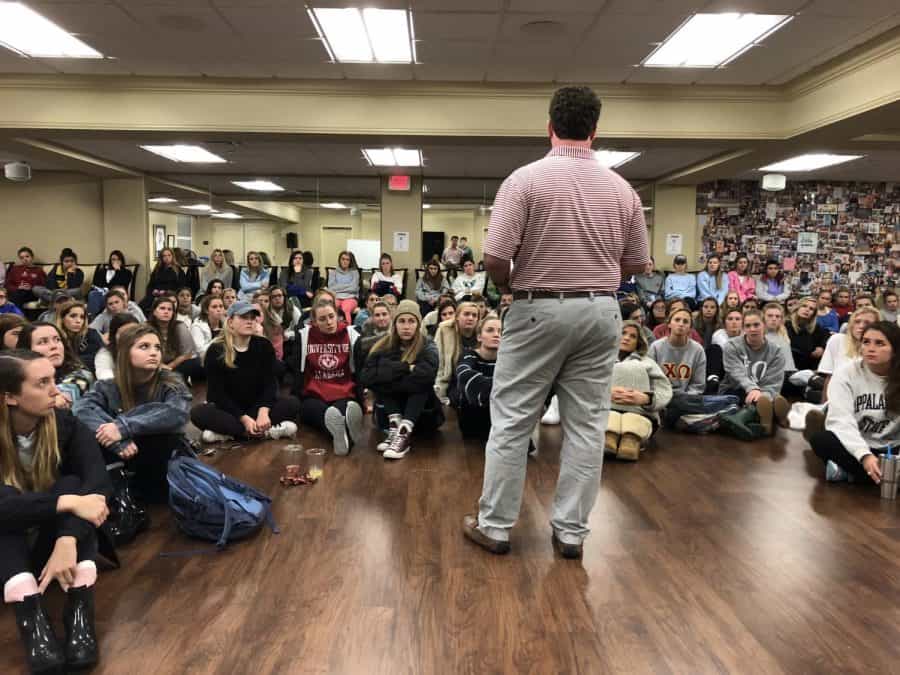Greek panels aim to combat Xanax abuse
January 14, 2019
On college campuses across the nation, students are obtaining access to a drug that is dangerous and life-threatening if not prescribed by a doctor or used properly. The amount of students using Xanax, a medication typically prescribed for anti-anxiety, illicitly has raised a red flag for students and higher authority figures at The University of Alabama.
A group of students concerned about the national phenomenon approached Associate Vice President of Student Health and Wellbeing Ruperto Perez. After discussing the issue, he and the group of students proceeded to create a program called the Greek Strong Task Force. The program was created in the spring of 2018 and was designed to address the concerns of the health and well-being of students within the UA Greek community.
Multiple fraternity and sorority presidents, SGA vice presidents, Interfraternity Council (IFC) and Alabama Panhellenic Association (APA) executive council members and other leaders around Tuscaloosa came together and created the Greek Speakers Panel Program. During October and November 2018, members held two panels each week where they talked with each Greek organization, sharing personal experiences and knowledge about the dangers of Xanax abuse.
“[The event] promoted safety and wellness for Greek students,” said Lauren Wise, a freshman majoring in marketing. “It’s nice to see other students that are just like us sharing their experiences and providing students with resources to get themselves or their friends help.”
More than 1,800 students attended the Xanax Speaker Series events in the fall. Now, the task force intends to expand and restart the series this semester.
Bailey Sanders, a sophomore majoring in aerospace engineering, said an issue with Xanax is that its use has been normalized among students.
“Students tend to look over things like using Xanax because they think it is a normal thing to do in college,” Sanders said. “But after hearing the speaker’s personal statements about the dangers of this drug, I think students will start taking the situation more seriously.”
In addition to the dangers of the drug, the University is a drug-free campus, and the Code of Conduct states any violation could lead to consequences of varying degrees.
“Students who violate any provision of the University’s Drug-Free Campus and Workplace policy will be held accountable for their behavior and will be subject appropriate disciplinary action,” according to The University of Alabama’s Code of Conduct policy on drug abuse. “Such action may include mandatory counseling, a reprimand and warning, loss of privileges, disciplinary probation, community service, restitution, attendance at alcohol and substance abuse classes, suspension, expulsion, and/or referral to the proper law enforcement authorities for prosecution.”
Students violating the Code of Conduct is another situation the Greek Strong Task Force is trying to prevent with the speaker series.
According to a press release about the speakers series, students Brent Turry and Grace Anne Lake, both members of the task force, hoped the personal testimonies at these panels would make an impact on students.
“Our task force has an end goal of bringing our community closer together by addressing our weaknesses and building on our strengths,” Turry said in the press release.
Lake said in the press release that her hope is for these powerful personal testimonies to impact at least one student every night someone speaks.
“That is a life that could be saved or a college experience that stays on track,” she said.
According to AddictionCenter.com, factors such as curiosity, stress or peer pressure can be attributed to college students’ high rates of drug abuse.
The students are truly living up to what it means to be a member of the Capstone by collaborating, designing, and delivering original, effective, and significant programming to their peers in the Greek community,” Perez said in the press release.
Ultimately, the Greek Strong Task Force holds these panels in hopes of raising awareness, but also aims to bring the community closer and make students think twice about abusing Xanax.





















